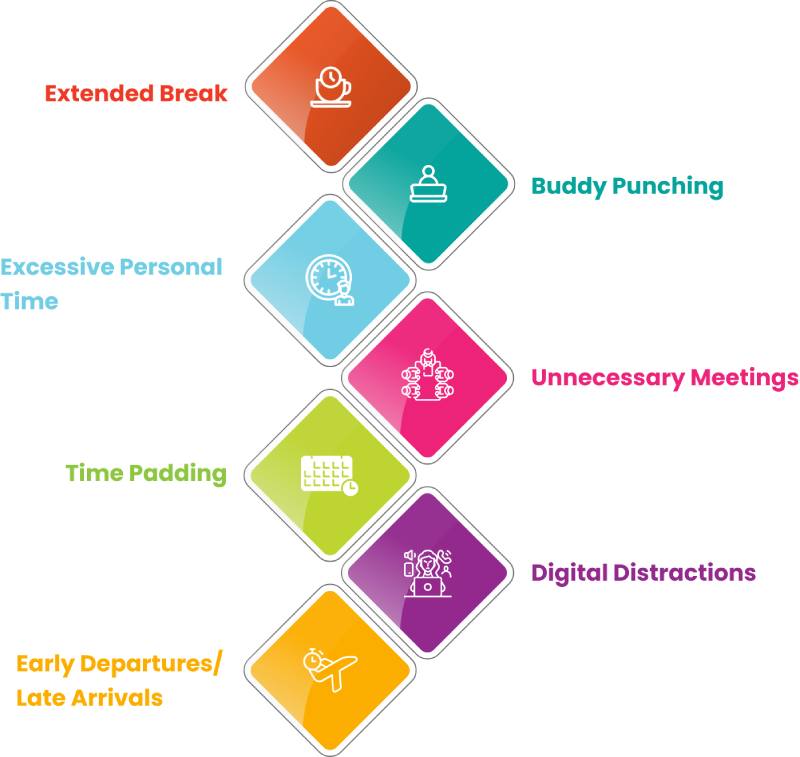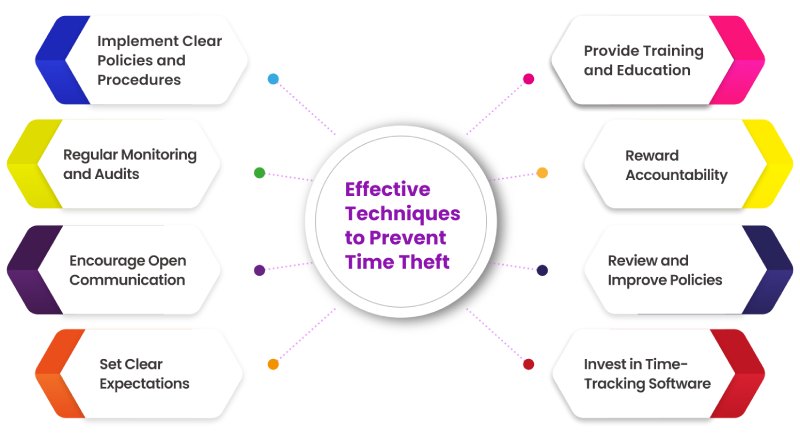You may have come across the term
‘Time Theft’ used in organizational
meetings, often accompanied by
concerns about productivity and
efficiency.
Right??
However, people
don’t realize that time fraud isn’t
just a catchphrase- it’s a real
issue that can even affect the most
efficient employees.
But, no
worries-
Join us as we delve
into the issue of time theft and
uncover ways to prevent it.
What is Employee Time Theft?
Employee time theft refers to
receiving pay from their employer
for the time they have not worked.
Example: Imagine an employee
who is supposed to start work at
9:00 A.M. but usually arrives at
9:15 A.M. every day. Instead of
adjusting his schedule, he writes
down 9:00 A.M. as his login time. At
the end of the month, he receives an
extra 5 hours of pay for time that
he didn’t work.
This may seem
minor, but it results in a huge
impact. What if this is being done
by many employees across the
organization over an extended
period?
What Causes Time Theft?
Well, this is the major issue that you need to know.
1. Poor Time Management:
Poor time management can have a direct impact on time theft as employees may feel disengaged or dissatisfied. Here are some factors that can lead to time fraud:
- Undervaluation: When employees feel that their work is not being appreciated or recognized, they become demotivated. As a result, they might engage in time theft as a subtle form of protest.
- Under-Challenged: When employees feel that their work is not very challenging, they may lack motivation to stay focused on work which automatically leads to wasting time on non-work-related activities.
- Job Dissatisfaction: If employees aren’t happy with their jobs due to factors like poor management, unfair treatment, etc. then there will be chances to engage in actions like taking excessive breaks or personal internet to show their dissatisfaction.
2. Lack of Accountability:
Lack of accountability within an organization can create an environment where employees feel that it is okay to spend/waste time on non-work-related activities.
- Lack of Monitoring: When managers do not monitor employee performance regarding attendance and productivity, employees may perceive this as permission to slack off without consequences.
- Unclear Expectations: If job roles, responsibilities, and performance standards aren’t communicated with the employees, then employees may not be able to prioritize tasks effectively which leads to spending time on unnecessary work.
- Inconsistent Enforcement: If rules and policies regarding breaks, attendance, and internet usage aren’t applied consistently, employees might start pushing limits or may take advantage of leniency.
3. Culture of Acceptance:
You may not believe it, but organizational culture plays a vital role in shaping the behaviour of employees. Here are some factors:
- Peer Influence: When some workers waste time, they can influence others to do the same which leads to time fraud.
- Lack of Consequences: If there are no or minimal consequences for engaging in time theft, employees may take lenience to continue this behaviour, believing there is little risk of being warned.
The above are the causes of time theft that are most likely to happen. Address these issues to avoid them.
Types of Time Theft that Occurs in the Workplace
As you have learned about the causes
of time theft, what may surprise you
is that it can occur in different
types, and you may not be able to
find out.
Here are the major
types that are likely to occur in
the workplaces:

1. Extended Breaks
When employees take more time for breaks than is allowed. Well, this could include taking longer lunch breaks than specified according to company policy or regularly going out for breaks during working hours that exceed standard durations. This is the most common type that happens in every workplace, yet it is hard to find.
2. Buddy Punching
The name sounds funny, but the practice isn’t. Buddy punching occurs when #employee1 asks help from #employee2 to clock in or out on their behalf. If #employee1 is running late or hasn’t arrived at the workplace at the scheduled time, they seek help from #employee2 to clock in on their behalf. They often attempt these actions hoping that managers or supervisors won’t notice their late arrival.
3. Excessive Personal Time
Employees spend work hours engaging in non-work-related activities such as browsing the internet, shopping online, chatting with friends, or making phone calls. These actions can be unavoidable sometimes, but continuing these activities frequently can cause a lot of damage. These actions don’t seem a big issue, but those lost minutes add up over time.
4. Unnecessary Meetings:
Attending or conducting meetings without any clear agenda or goals is a waste of time. They often conduct these meetings to avoid doing work.
5. Time Padding
This happens when an employee claims that they have worked more hours than actual working hours by inflating the minutes or hours in timesheets. This can increase the number of hours they claim to have worked and is a form of deceit that results in the employer losing money.
6. Digital Distractions
Some employees are likely to engage in social platforms during working hours such as web surfing, playing games, etc. It can also result in reduced focus on the work that needs to be done which causes low productivity and efficiency as well.
7. Early Departures/ Late Arrivals
Employees leave before the clock-out
time sometimes, this could range
from leaving a few minutes early or
arriving at the workplace late.
These could be intentional, and some
might be unintentional as well.
The above-mentioned are the
most common types of time theft that
are likely to happen almost in every
organization.
Is Time Theft Illegal?
There is no federal law that says
time theft is a criminal offence.
However, it is more often
viewed as a violation of company
policies and procedures rather than
a legal offence. Employees who
practice time fraud, for example, by
providing fake working hours, etc.,
can suffer severe penalties. This
might include being punished or even
being fired from their job or
position.
If the time theft
involves fraud:
For instance,
manipulating timesheets, etc. could
lead to legal consequences. Even
though it is not a criminal offence,
it is considered a serious offence
and may lead to severe consequences
for the employees involved in it.
The punishments vary based on
the organization, as every
organization has its own policies
and legal considerations.
Consequences of Time Theft
It’s high time to understand the consequences that time fraud brings to the organization:
Time Theft Impact on Employees:
1. Loss of Trust and Reputation
It can ultimately damage the reputation of the employee and cause a huge loss of trust from colleagues and managers. It marks the employee as untruthful and untrustworthy. It can result in gaining a negative image in the organization. It affects getting chances of promotions and career advancement. Employers value punctuality and honesty and discovering time fraud can be deeply disappointing to them.
2. Disciplinary Actions
Common penalties for employees found
practising time theft may include
verbal warnings, written
warnings, unpaid
suspensions, or even dismissal from
the company based on the severity of
the offence and company policies.
These actions can have major effects
on an employee’s financial and
career implications in the long run.
For instance, being fired for
doing something wrong can make it
harder to find another job and may
require an explanation of why they
lost the job.
3. Legal Consequences
If stealing time involves activities such as forging documents or deliberately providing false information, it may lead to legal repercussions. These consequences could range from penalties to legal process in the worst-case scenario. Punishment for such crimes includes a criminal record that can last for the rest of the convict’s life, which can significantly reduce their employment opportunities in the future.
It directly impacts productivity because employees are not contributing the expected amount of work while on the company’s payroll. This inefficiency can harm the organization’s performance and achievements. Stealing time can lead to delays in completing work or tasks on time, which affects project schedules. This is especially critical when time is crucial, as decreased productivity and efficiency can have severe consequences.
4. Employer Distrust and Increases Monitoring
It could lead an employer to tighten the monitoring process. This could include increased surveillance, stricter adherence to timekeeping, or more frequent audits of employees’ working hours. While these practices aim to prevent and monitor time fraud, they can also increase stress in the workplace for all employees. Heightened monitoring might make employees feel constantly watched, which can reduce trust and hinder self-management within the organization.
Time Theft Impact on Employers:
1. Financial Losses
It is a direct loss to employers since it results in financial losses. When employees participate in time fraud, they are being paid for the time they have not worked. These losses, if accumulated over time, will reduce the overall profitability of the company.
2. Reduces Productivity
This is the direct impact that it reflects on the organization. When employees aren’t committed to their work or they don’t come to work on time, it slows down the work which needs to be done. This inefficiency can lead to the failure to complete tasks and projects on time, which will impact the company’s capacity to meet the client’s expectations and business objectives.
3. Impact on Employee Morale
Time fraud can make some employees feel that they are treated unfairly while others violate rules by taking long breaks or early clock-outs. This can lead to lower motivation among the team. When morale is low, people may not perform as well, and some may quit the job.
4. Negative Work Culture
A workplace in which time theft is prevalent can create a toxic environment. Remember, in every organization, there will be genuine hard workers and time frauds. Employees who genuinely put effort into getting things done might be frustrated by seeing people taking advantage. This isn’t a general thing. This might even lead to employees changing their jobs from one organization to another.
Importance of Addressing Time Theft at Workplace
As you have seen, the major
consequences that time theft brings
to the organization. This is a
problem that should be addressed
seriously. Address carefully as we
have discussed how many types of
time frauds can occur in workplaces.
These problems can negatively
affect the trust within the team and
the success of the company if left
unaddressed. When you look at all
the possibilities of time fraud, you
see how crucial it is to have good
policies, improved methods of time
tracking, and the education
of people on the importance of being
truthful.
Preventing time fraud
is not only about saving resources.
It is about maintaining the
workplace positively. Engaging
against this issue shows a
commitment to a culture where
employees’ work is appreciated and
people are trusted.
Effective Techniques to Prevent Time Theft
It is crucial to address employee time theft. Implement these techniques to prevent time fraud:

1. Implement Clear Policies and Procedures
Ensure that clear policies are set and explain to the employees about the working hours, lunch breaks, and expectations of attendance. It should state what happens to time thieves, and why it is important to report time honestly. These policies are reviewed and updated from time to time to ensure that they are still applicable and well understood.
2. Regular Monitoring and Audits
It is important to conduct periodic audits of time records to identify any issues or problems. Based on the patterns of unauthorized absences, long breaks, or irregular time records, you can suspect cases of time fraud. Employee Monitoring plays a crucial role in prevention because employees are fully aware that their working hours are being recorded, which encourages them to adhere to the established policies.
3. Encourage Open Communication
Encourage employees to report any perceived cases of time fraud in the workplace without fear of punishment. Promoting free speech allows supervisors to address issues promptly and provide fair solutions, while also upholding principles of integrity in time management.
4. Set Clear Expectations
When the roles, responsibilities, and performance expectations are clearly stated, it helps the employees know what is expected from them while at work. When expectations are clear, employees are likely to remain more productive on tasks, thus minimizing cases of time fraud.
5. Provide Training and Education
It is important to raise awareness among the employees about the importance of utilizing time and the effects of stealing company time. Training should not only focus on how to use the time tracking systems but also on the ethical issues and the consequences of time fraud on the team and the organization.
6. Reward Accountability
Reward employees who always follow company policies and are honest in time management because it encourages positive behavior. Employers should publicly appreciate employees who keep good records of time since it helps to discourage time fraud among employees.
7. Review and Improve Policies
Regularly review and update the policies to keep it efficient as you can. Seek feedback from employees and managers since it helps to improve the process of identifying loopholes or challenges in the implementation process. Ensure that the policies are updated according to the feedback and new industry trends to ensure time management practices are fair and transparent.
8. Invest in Time-Tracking Software
As we have seen the causes and the
negative impacts that time theft
gives. Most of these issues are
resolved by using a time tracking
software.
Yes!! It’s
true!
These tools help
employers get an idea of the
employee’s clock-in hours,
thus minimizing errors and
preventing individuals from faking
hours they never worked.
Time Champ is an effective time-tracking software that accurately monitors employees’ working hours. Time Champ provides detailed reports on employee performance, helping you identify instances of time theft. It also tracks both productive and non-productive activities, offering clear insights into what employees are doing throughout the day. This software helps organize time better and addresses issues related to time management.
Conclusion
Addressing time fraud is important for fairness and productivity in the workplace. When employees falsely claim pay for hours they didn’t work, it can lead to morale and legal issues. This can be resolved by using time-tracking software like Time Champ, which offers features designed to prevent time theft. By focusing on accountability, clear expectations, and ongoing training, organizations can build a culture of honesty and effectiveness. These steps help to protect company resources and create a positive workplace where everyone feels valued.




